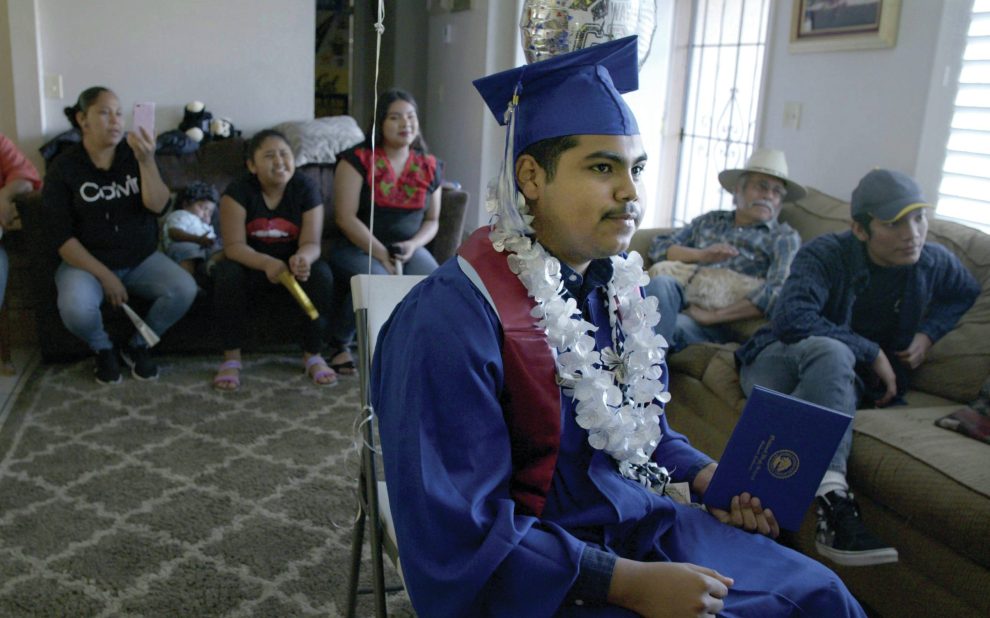In September 2019, when Peter Nicks started shooting a documentary about the senior class at Oakland High School, he’d already made two award-winning films about the struggles of major Oakland, California institutions. The Waiting Room (2012) goes deep into the city’s largest public, open-access health care provider. The Force (2017) turns its gaze on the Oakland Police Department. Homeroom (now streaming on Hulu) was just supposed to round out the trilogy.
Then, three months before graduation, everything changed. Instead of making a Frederick Wiseman–style chronicle of a bureaucracy and its failures, Nicks found himself following a group of sharp, media-savvy Black and brown teenagers as they navigated the worst public health crisis of the past century and the most massive wave of public protest in U.S. history. In the process, the viewer sees what could be the vanguard of a generation that is simply not going to accept the current power arrangements in the United States.
A portrait of Oakland High was never going to be anything like Fast Times at Ridgemont High (1982). At this school, white students are a rarity. Ninety-four percent of students are Hispanic, Asian, or African American, and 86 percent get free or reduced lunch. However, the school also has a principal who stands at the doorway greeting individual students, a theater program developed enough to try putting on In the Heights, and what seems to be a pretty healthy esprit de corps. Oakland High is also home to Denilson Garibo, one of two voting student representatives on the Oakland school board.
The first half of the movie gives us some of the normal inside-high-school material we expect. An algebra teacher labors to explain the graphing of equations; another exasperated teacher warns students to put away their phones. There’s a pep rally, football game, and homecoming dance. Students take endless photos and videos of themselves and one another and post them on the usual social media time bandits.
However, we also get glimpses of the students’ very serious struggles. In a college prep session, students discuss college application essays and wonder how to portray lives punctuated by bursts of gunfire and sidewalks littered with used syringes. One student recalls moving three times in the last year and wonders if his essay should refer to gentrification as the “unstable house market of Oakland.”
Also, during the in-person phase of the school year, Garibo and his colleague from another school, Mica Smith-Dahl, introduce a resolution asking the school board to abolish the district’s own police force. Like many urban school districts, Oakland is facing a budget crisis, and the students think getting the armed enforcers out of the schools is a good way to save money.
As one student later puts it, “There are a lot of students who have PTSD when it comes to police officers. . . they see people that look like them get arrested, family members get arrested. . . . And then, like, school’s supposed to be a safe place and. . . you see them there as well.”
The students in Homeroom face complexities that previous generations could never have imagined.
Advertisement
At the board meeting Garibo even notes that an accidental brush with school police could spell disaster for his undocumented family members. Still, they lose the vote, but the student leaders immediately begin planning the next round of their fight. When the pandemic hits, all this official in-person activity ceases, and the documentary moves almost entirely into the digital universe. A river of Zoom meetings, Facetime conversations, and TikTok videos flow past, and it’s through the students’ glowing little screens that we see the non-COVID-19 horrors of early 2020 unfold: Ahmaud Arbery in February, Breonna Taylor in March, then George Floyd in May, and the floodgates break.
While getting through finals and preparing for graduation, the student leaders manage, via social media, to put together a march of thousands to the home of Oakland mayor, Libby Schaaf. Garibo and Smith-Dahl reintroduce their police abolition measure. It goes on the board docket, and the rest is history. The documentary takes us through the students’ virtual graduation—posed in caps and gowns before laptops in living rooms or backyards. Other documentary takes on high school life, from the up close and personal to the systematic. The school board vote, on Zoom, of course, provides the movie’s real moment of catharsis.
The students in Homeroom face complexities, obstacles, and temptations that previous generations could never have imagined. One takeaway from the movie is that at least some of them are coming out all the stronger for the experience.
However, another less-inspiring takeaway is this: Too many of the adults in this story are, for whatever reason, simply in default mode. A well-meaning English teacher accepts lame, inarticulate, and only half-thought responses to a discussion question without seriously pushing for more. Students talk over a teacher in the classroom, and she lets them. School cops holding Q&A sessions with students simply assert their civic-minded righteousness, and when the students submit compelling evidence to the contrary, they only repeat their assertions.
Off campus, a school board member justifies her vote to retain the school’s police force with the irrelevant argument that she has a relative in another city who is a good cop. And Schaaf, meeting with the student leaders, only bathes them in the corn syrup rhetoric of feel-good liberalism, actually saying, “I want you all to see yourselves as I see you, like the most incredible, powerful, brilliant, amazing, talented human beings on the planet. . . . I just encourage you to, like, know your power and claim it.” For a moment there I really thought we might have switched the stream to an episode of Veep.
However, in 30 years, all of those folks will be gone. Garibo and his friends will be in charge, and, if they don’t get distracted to death by those little screens, the world will be better off for the change.
This article also appears in the November 2021 issue of U.S. Catholic (Vol. 86, No. 11, pages 36-37). Click here to subscribe to the magazine.
Image: Hulu














Add comment